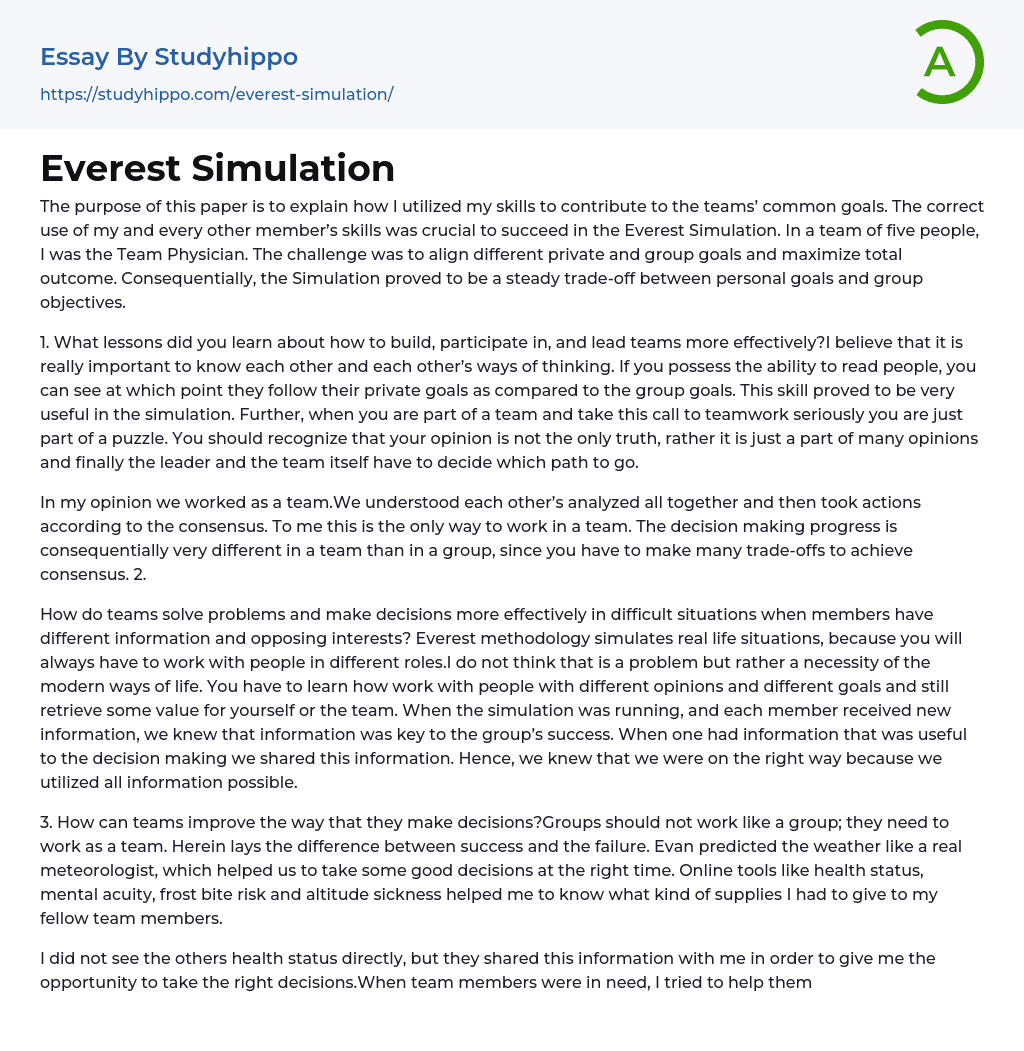In this paper, my contribution to the team's shared goals by utilizing my skills will be explained. The effective utilization of skills from each member was vital for success in the Everest Simulation. As the Team Physician in a group of five individuals, the objective was to reconcile separate individual and team targets and optimize the overall result. Consequently, accomplishing the Simulation required a continuous balancing act between individual objectives and group outcomes.
The importance of building, participating in, and guiding effective teams has been learned from various educational sources. Understanding each team member's perspective and approach is crucial. Being able to comprehend individuals distinguishes between individual and group goals; this skill was exhibited during the exercise. Additionally, it is essential to recognize that as a team member, you are just one component of the broader image. Maintaining
...an open mind and acknowledging that your viewpoint is only one among many others is critical. Ultimately, both the leader and team must reach collective decisions about which direction to take.
In my perspective, working as a team entails mutual understanding and collective analysis before executing actions based on consensus. This approach represents the only viable way of operating within a team. Compared to groups, decision making within a team involves numerous trade-offs to guarantee agreement.
The Everest methodology offers a solution to effectively solve problems and make decisions in difficult situations, even when team members possess differing information and interests. This approach simulates real-life circumstances, where collaborating with individuals in varying roles is not a problem but a necessity of modern life. It is indispensable to learn how to work with people of diverse opinions and objectives whil
still deriving value for oneself and for the team. During the simulation, it became apparent that sharing informative insights was crucial to the group's success. The team was aware that accessing each member's unique information was key to making informed decisions. By utilizing all possible data, we were confident that we were on the right path towards achievement.
3. Enhancing decision-making among teams requires a shift from group work to team collaboration, as this can determine if the outcome is favourable or unfavourable. Evan's accurate weather forecast was instrumental in our timely and effective decision-making. Additionally, web-based tools such as mental agility monitoring and frostbite and altitude sickness risks helped me provide appropriate supplies to our team members.
Although I did not witness the health of my team members firsthand, they disclosed it to me so that I could make informed decisions. Whenever any member required assistance, I extended my guidance to the best of my abilities. With regards to situations that entail time and competitive pressures, leadership approaches play a crucial role in team performance. A competent leader is not someone who solely makes decisions without considering their team's input, as opposed to an authoritarian "boss".
A competent leader plays a crucial role in ensuring the success of a team. This is achieved by empowering and taking care of their team while recognizing their expertise and relying on their knowledge when needed. In our group, Chris demonstrated these qualities by permitting us to participate in decision-making, considering our advice, and allowing us to influence the outcome for optimal results.
"The difference between a boss and a leader: a boss says, 'Go!'- a leader says, 'Let's go!'." 5.
Effective team leaders comprehend the possible tradeoffs associated with finishing short-term tasks versus sustaining long-term team efficiency. They acknowledge the necessity of balancing both goals and making informed decisions accordingly. For instance, if the team aims to reach the summit in six days but one member desires to take a day off for photographs, the leader must consider how this will impact progress. A skilled leader always plans ahead and considers present actions while keeping an eye on future steps.
While short-term decision making may provide immediate benefits, it does not necessarily ensure accomplishment of long-term objectives. Cognitive biases can negatively affect decision making. Working alone without collaboration with others can result in issues. Our team improved our success by exchanging diverse perspectives and information based on personal experiences. In mountain climbing, concentrating solely on individual gains leads to failure for both the team and the individual, hence teamwork was crucial to our triumph.
It's important to maintain a balance between individual choices and their impact on the team as a whole.
- Anatomy and Physiology essays
- Addiction essays
- Biodegradation essays
- Dental Care essays
- Disease essays
- Disorders essays
- Health Care essays
- Intelligence Quotient essays
- Nutrition essays
- Olfaction essays
- Public Health essays
- Women's Health essays
- World health organization essays
- Cancer essays
- Infectious Disease essays
- Lung Cancer essays
- Neurology essays
- Physical Exercise essays
- Medicine essays
- Sex essays
- Inquiry essays
- Disability essays
- Poison essays
- Action Potential essays
- Nervous System essays
- Childbirth essays
- Puberty essays
- Blood essays
- Kidney essays
- Neuron essays
- Body essays
- Glucose essays
- Sense essays
- Heart essays
- Skeleton essays
- Human Physiology essays
- Eye essays
- Immune System essays
- Muscle essays
- Skin essays
- Brain essays
- Central Nervous System essays
- Human Skin Color essays
- Digestive System essays
- Common sense essays
- Respiration essays
- alcoholism essays
- Smoking essays
- Casino essays
- Tobacco essays




